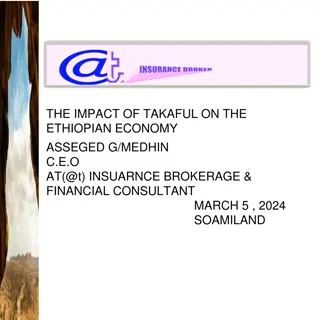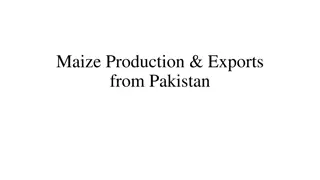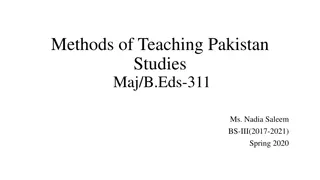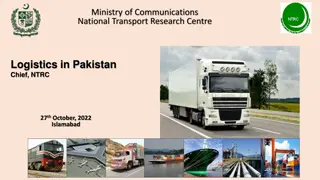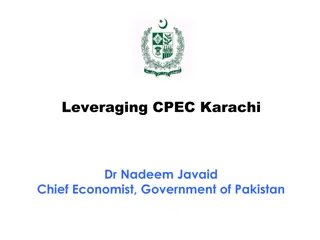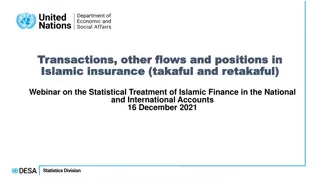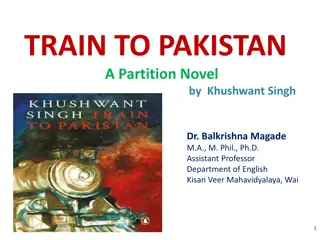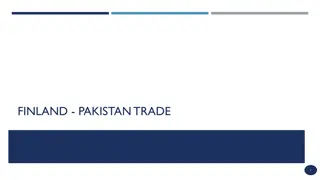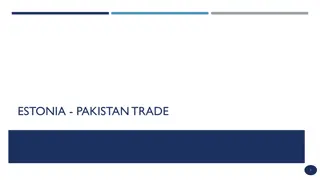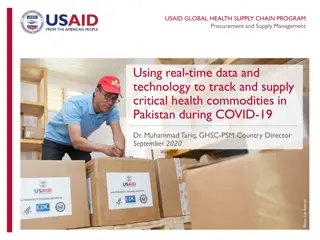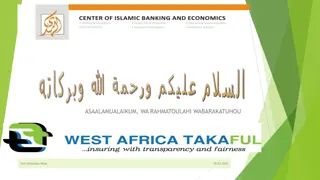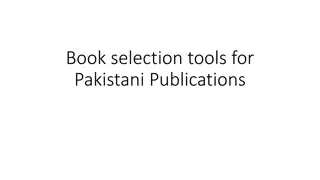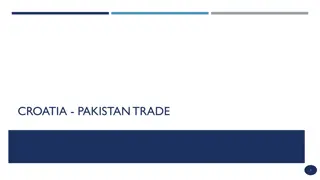Challenges and Opportunities for Takaful Industry in Pakistan
The Takaful industry in Pakistan faces both challenges and opportunities as it navigates the insurance landscape. With a history dating back to ancient times, the modern insurance sector in Pakistan has evolved significantly, with conventional and Islamic insurance models coexisting. The regulatory framework, market dynamics, and consumer preferences all play a role in shaping the future of Takaful in the country.
Download Presentation

Please find below an Image/Link to download the presentation.
The content on the website is provided AS IS for your information and personal use only. It may not be sold, licensed, or shared on other websites without obtaining consent from the author.If you encounter any issues during the download, it is possible that the publisher has removed the file from their server.
You are allowed to download the files provided on this website for personal or commercial use, subject to the condition that they are used lawfully. All files are the property of their respective owners.
The content on the website is provided AS IS for your information and personal use only. It may not be sold, licensed, or shared on other websites without obtaining consent from the author.
E N D
Presentation Transcript
The challenges and opportunities for Takaful industry in Pakistan Sanaullah Ansari Assistant Professor Shaheed Zulfikar Ali Bhutto Institute of Science & Technology (SZABIST), Islamabad
Introduction The concept of insurance is very old in the world In early times, the protection system against risk and security on loans were present before 2250 B.C. Contract of Bottomry (loan for voyage) and Respondentia (loan on good leden on board a ship) were also in practice in 1600 B.C. in Phoencia for sea trade and around 4000 B.C. for land and before 600 B.C. for sea and land trade in India The modern form of insurance started from Northwest Europe in 8th century
Introduction The concept of marine insurance was started in 12thcentury It was formally formulated in 17thcentury when sea trade was at its peak Later, insurance industry developed rapidly and modern insurance systems were implemented throughout the world Currently, there are several types of insurance contracts including: Marine Insurance Health Insurance Agriculture Insurance Life Insurance Vehicle Insurance
Insurance Industry in Pakistan Insurance industry is working since 1947 in Pakistan Controller of Insurance was operating Insurance industry under Ministry of Commerce, Government of Pakistan Securities and Exchange Commission of Pakistan (SECP) is regulating the Insurance industry since January 2001 The SECP regulates and monitors the Insurance industry in the country through powers vested in the Insurance Ordinance 2000 and the Companies Ordinance 1984 Total premium revenue of Pakistan Reinsurance Company Limited was Pak Rupees 9 billion by the end of 2014
Conventional Insurance in Pakistan Conventional Insurance Working in Pakistan since 1947 Following Conventional Insurance Models based on Riba (Interest) By the end of 2014, 7 Life Insurance Companies with Gross premium of Pak Rupees 122 Billion 38 General Insurance Companies with Gross Premium of Pak Rupees 62 Billion Total Gross Premium of Pak rupees 184 Billion
Islamic Insurance (Takaful) in Pakistan Islamic Insurance (Takaful) Government of Pakistan assigned the task to Council of Islamic Ideology in 1983 to draw a framework of Islamic Insurance (Takaful) Under the recommendations of Council, Takaful Rules were established in 2005 First Takaful Company was established in 2006 in Pakistan (Pak-Kuwait Takaful Company Limited) Following Wakala-Waqf Model which are Riba-Free By the end of 2014, 2 Family Takaful Companies with Gross premium of Pak Rupees 6 Billion 3 General Takaful Companies with Gross Premium of Pak Rupees 2 Billion Total Gross Premium of Pak Rupees 8 Billion
Insurance Industry and GDP of Pakistan The contribution of overall insurance industry in country s GDP was 0.61% in 2008 Life insurance industry s contribution was 0.28% Non-life insurance industry s contribution was 0.33% Overall insurance industry s contribution was increased to 0.77% in 2014 Life insurance industry s contribution was 0.51% Non-life insurance industry s contribution was 0.26%
Contribution of Insurance Industry in Pakistan s Economy Contribution of insurance industry in Pakistan s economy from the period of 2010 to 2014 is as follows: Total premium written by all insurance companies was Pak Rupees 732 Billion Total claims paid were Pak Rupees 294 Billion Tax contributions to government exchequer was Pak Rupees 45 Billion In 2014, total number of employees working in insurance companies was 14,488
Growth Rate of Insurance Industry The overall industry s growth rate was 14% in 2008, 12% in 2009, 18% in 2010, 23% in 2011, 18% in 2012, 22% in 2013 and 13% in 2014 Life insurance growth rate was 25% in 2008, 22% in 2009, 27% in 2010, 30% in 2011, 22% in 2012, 40% in 2013 and 16% in 2014 Non-life insurance industry s growth rate was 7% in 2008, 4% in 2009, 9% in 2010, 16% in 2011, 14% in 2012, 0% in 2013 and 6% in 2014
Takaful (Islamic Insurance) The concept of modern Takaful (Islamic Insurance) is not very old as it started with the beginning of Islamic banking in the world in 20thcentury The basic principles of Takaful are Taawun (mutual assistance) and Tabarru (donations, gift, give away) All these terms are the part of Kafala concept which means to help each other Therefore, the mechanism of Takaful is based on Wakala- Waqf Model
Wakala-Waqf Model All the products of Takaful strictly follow Sharia h rules, regulations and laws Sharia h Advisory Board is responsible to watch the business decisions and activities In Takaful, individuals of a community gather on a common platform to contribute reasonable amounts into Waqf Fund to protect themselves and others from future losses In case of any loss, it is compensated by Waqf Fund and Takaful Operator is not responsible for the compensation At every year end, the excess amount which is left after paying all claims and expenses can be distributed among all the participants of the Waqf Fund with the advice of Sharia h Advisory
Wakala-Waqf Model Shareholders of a Takaful company are not entitled to get the profits which are generated by the insurance operators which is in contrast with conventional insurance companies where profit generations from insurance transactions is the primary objective Similarly, the policyholders of Takaful Company have the right to cast their vote in the elections of company s directors and they have the access to the final accounts of the company as well However, these rights are not available to the policyholders of conventional insurance companies These differences are making Takaful industry more popular than conventional insurance among Muslim population in Pakistan
Challenges and Opportunities for Takaful Industry in Pakistan As roots of conventional insurance are very deep in the country, it is very difficult for Takaful companies to penetrate in the market Therefore, these companies have to face many challenges for their survival in the market Many of the consumers are tempted towards Takaful due to religious reasons which provide great opportunities to this industry in Pakistan A vast majority of consumers also keep in mind the products and benefits being offered by these companies To investigate about these challenges and opportunities, open ended interviews were conducted from the employees and consumers of Takaful companies 50 employees and 50 consumers were interviewed to get their feedback and opinions In the light of the interviews, many challenges and opportunities for Takaful companies in Pakistan are found
Challenges and Opportunities for Takaful Industry in Pakistan Lack of Awareness According to the respondents, consumers are fully aware about the mechanism, products and benefits of conventional insurance However, it is the major challenge for Takaful companies that consumers are not fully aware about the Islamic principles of insurance Very low literacy rate plays vital role in the creation of this problem Those, who are responsible to provide full information about Islamic principles of business, are not performing their role Therefore, there is a very big knowledge gap in the country
Challenges and Opportunities for Takaful Industry in Pakistan Lack of Awareness Consumers who want to switch from conventional to Islamic mode of insurance are very much confused Takaful companies are also responsible for this ignorance as they are not providing proper knowledge to their current and potential consumers Even, employees of Takaful companies are not fully trained and aware about their system and products, they are also misguiding their consumers Takaful companies should play their role positively and effectively to provide proper and complete knowledge to the consumers If they will do it, there is a huge market waiting for these companies.
Challenges and Opportunities for Takaful Industry in Pakistan Unclear Practices by Takaful Companies In the light of the answers by the respondents, it is found that the practical system of Takaful is being partially understood by the consumers As Takaful companies are following Wakala-Waqf Model, there is still ambiguity about the practices being followed by them Similarly, the products of conventional and Islamic insurance are almost same; questions arise about the practicality of these products of Takaful companies The operational staff of Takaful companies is also not able to answer the practicality of their respective company This is the responsibility of Takaful companies that they should provide proper information about the mechanism and practices which they are following If consumers would know about the practices being followed by these companies, their trust will boost and they will switch from conventional to Islamic insurance
Challenges and Opportunities for Takaful Industry in Pakistan Business Volume Respondents were also very keen about the comparison of business volume in between conventional insurance companies and Takaful companies Business volume of insurance companies is measured by total premium revenue By the end of December 2014, total premium revenue of insurance industry in Pakistan was Pak Rupees 192 billion which consists of Pak Rupees 64 billion of non-life companies and Pak Rupees 128 billion of life insurance companies In this total business volume, the proportion of Takaful companies is Pak Rupees 8 billion which is only 4.2% of the total insurance industry As Takaful companies are trying hard to increase their business volume but they are not succeeding due to the reason that they are not marketing their products efficiently Both employees and consumers suggest that Takaful companies should work aggressively to increase their business volume Unless these companies capture the larger proportion of the market, their survival and growth will be at stake
Challenges and Opportunities for Takaful Industry in Pakistan Re-Investments All insurance companies reinvest pooled funds of their premiums in different sectors to generate profits which are required by them to manage their expenditures, payment of dividends to shareholders and for the settlement of claims Conventional insurance companies reinvest their funds in every type of business sectors whether they are Sharia h compliant or not Whereas, this is an ethical, moral and legal obligation for Takaful companies to invest only in those business sectors which are Sharia h compliant Takaful companies are claiming that they are reinvesting their funds in such business sectors but as consumers do not have complete access to the information and records, there is still an ambiguity in their minds that these companies are not properly following Sharia h principles Similarly, Takaful companies are also not trying to satisfy their consumers on this particular issue, which is creating a gap between these two Consumers suggested that Takaful companies should make it clear that in which business sectors they are reinvesting so that they could be satisfied.
Challenges and Opportunities for Takaful Industry in Pakistan Claims Settlements According to the respondents, the services performance of insurance companies is checked by their claims settlements Claims are cross verified by insurance companies to complete their legal obligations and then these are decided to be settled completely, partially or refused The processing time of this verification plays vital role in whole process Unnecessary delay in this process loses the confidence of the consumers towards the company as they expect quick settlement of their claims Therefore, conventional insurance companies are trying their best to lessen the processing time for the satisfaction of their consumers However, Takaful companies are still facing this problem as their processing for claims settlement is not satisfactory due to several reasons These companies are suggested by their employees and consumers to make valuable reforms in their claims settlement process so that their trust towards consumers can be strengthen further
Challenges and Opportunities for Takaful Industry in Pakistan Tough Market Competition As conventional insurance is the major share holder of insurance industry in Pakistan, it is giving tough competition to Takaful industry Being a small part of this huge industry (only 4.2%), Takaful companies are facing large number of challenges to overcome the monopolistic position of conventional insurance in the country The respondents suggested that the only way to be in this competition and to gain a reasonable proportion, Takaful companies have to develop further by providing new Sharia h compliant products and to provide excellent services to their consumers In their opinion, new product development, establishment of new companies, extension in current branch network and provision of better quality services would be helpful for Takaful companies to grow in future
Conclusion In the light of the responses by the employees and consumers of Takaful companies, it is concluded that there is a huge market of insurance in Pakistan as people want to avail life and non-life insurance services But, majority of the Muslim consumers are avoiding from it due to religious reasons as conventional insurance is based on Interest (Riba) Whereas, the basis of Takaful is Sharia h compliant and this industry is working according to the guidance and teachings of Islam Therefore, there is a huge potential of Takaful business in the country as vast majority of Muslim population want to join it due to religious reasons
Conclusion As a tiny part of the overall insurance industry in the country, Takaful companies are trying their level best to provide Islamic insurance services to their consumers But, due to several limitations, they are not performing as per the expectations of the market and consumers There are several challenges which are negatively impacting the progress, development and growth of this industry Lack of awareness, unclear practices by these companies, business volume, re-investments, claims settlements and tough market competition are the major problems being faced by Takaful companies
Conclusion These can be overcome by providing awareness about Islamic Insurance to the vast majority of consumers, developing new and Sharia h compliant products, aggressive marketing of services, establishment of new Takaful companies, increasing branch network of existing companies and by satisfying the consumers by all means If Takaful companies would succeed to overcome these challenges, there will be a revolutionary development in Pakistan as there are unlimited opportunities and huge potential for Takaful industry in this market


